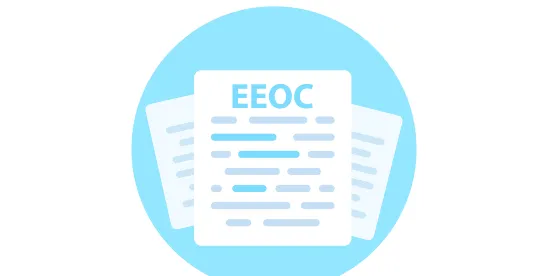On April 3, 2025, a group of former U.S. Equal Employment Opportunity Commission (EEOC) officials issued a statement defending specific employer diversity, equity, and inclusion (DEI) programs in response to technical assistance issued by the acting director of the EEOC last month.
Quick Hits
- A group of former EEOC officials has issued a statement asserting that employers can implement specific DEI programs without violating antidiscrimination laws, despite recent technical assistance from the acting chair of the EEOC that could classify such initiatives as unlawful discrimination.
- The former officials argued that proactive efforts to promote diversity and equal opportunity are essential and can be executed lawfully.
- They identified specific DEI-related initiatives: antidiscrimination training, employee resource groups, broader recruitment efforts, and demographic data collection, as lawful practices that can help employers prevent unlawful discrimination.
In the lengthy statement, the group of former EEOC officials argued that despite EEOC Acting Chair Andrea Lucas’s recent technical assistance, “employers lawfully may—and indeed should—take proactive steps to identify barriers that have limited the opportunities of applicants and employees based on any protected characteristic.”
The new EEOC technical assistance documents, issued on March 19, 2025, aligned the EEOC with President Donald Trump’s executive orders to eliminate “illegal” DEI in employment. The documents clarify the acting chair’s position that employers may be engaging in unlawful discrimination if they use race, sex, or another protected characteristic as just one deciding factor in an employment decision, even if not the sole deciding factor. The technical assistance further stated that employee resource groups (ERG) or affinity groups may be unlawful if they are not open to everyone.
However, the former EEOC officials’ statement argued that companies have a legitimate interest in promoting diversity, and employers can “adopt effective and lawful mechanisms to support diversity by advancing equal opportunity for all employees, without the use of illegal preferences.” (Emphasis in original).
“Properly constructed, such efforts are not discriminatory,” the former EEOC officials said in the statement. “To the contrary, they can help prevent and address the discrimination that continues to deny equal employment opportunities to qualified workers and applicants and prevents employers from utilizing the full talent of our communities.”
The statement is signed by several former EEOC officials who held the roles of chair, vice chair, acting chair, commissioner, general counsel and legal counsel including Charlotte Burrows (commissioner from 2015-2025 and chair 2021-2025), Chai R. Feldblum (commissioner 2010-2019), Christine Griffin (commissioner 2006-2009, vice chair 2009), Stuart I. Ishimaru (commissioner 2003-2012, acting chair 2009-2010), Jocelyn Samuels (commissioner 2020-2025, vice chair 2021-2025), and Jenny Yang (commissioner 2013-2018, vice chair 2014, and chair 2014-2017; and director of the Office of Federal Contract Compliance Programs (OFCCP) 2021-2023), Karla Gilbride (general counsel 2023-2025), P. David Lopez (general counsel 2010-2016), Peggy R. Mastroianni (legal counsel 2011-2017), and Ellen Vargyas (legal counsel 1994-2000).
Specifically, the former EEOC officials identified several DEI programs that were called into question by the recent technical assistance that they argued might be implemented without violating antidiscrimination laws: (1) employer antidiscrimination and harassment training, (2) ERGs or affinity groups, (3) broader recruitment efforts, and (4) data collection designed to identify or prevent potential unlawful discrimination.
- Antidiscrimination and Harassment Trainings—The statement argued that employer antidiscrimination and harassment trainings rarely rise to the level of unlawful discrimination. To establish such a claim, it is insufficient to show that the training made employees uncomfortable; they must show that it created a hostile work environment. According to the statement, this standard has only been met in extreme cases, such as when an employee alleged that his genitals were touched during a simulation or when an employee alleged he was required to attend several conferences and trainings that “‘ascrib[ed] negative traits to white people or white teachers without exception and as flowing inevitably from their race.’”
- Employee Resource Groups / Affinity Groups—Similarly, the statement argued ERGs, employee business groups, and/or affinity groups are likely lawful if they are voluntary and open to all employees, even if they focus on shared experiences of members of a protected class or who share a protected characteristic. The statement noted that employers must apply “the same approval process and criteria, including for material support” to all groups.
- Broader Recruitment Efforts—The statement argued that employers may lawfully broaden their applicant pools to find talent from diverse groups by expanding the places and channels they use to advertise job listings and engage in outreach, including to historically Black colleges and universities, women’s colleges, smaller colleges, and trade schools. Further, the statement argued that employers could review and revise their qualification criteria to remove barriers to qualified candidates, such as removing a requirement for a four-year degree to hold a particular position.
- Data Collection—The statement also defended the lawfulness of employers’ demographic data collection as a “best practice” to “ensure compliance with applicable civil rights laws.” The statement noted that as long as employees are not required to provide such information, employers’ collection and examination of such data “is crucial for employers to identify and correct any barriers to equal opportunity before those barriers result in a lawsuit.”
Next Steps
The statement from the former EEOC officials comes as employers grapple with the Trump administration’s attacks on DEI while trying to implement programs to prevent unlawful employment discrimination and avoid liability from unlawful discrimination lawsuits. The EEOC has sought to align its guidance with the Trump administration’s policies, raising concerns about the lawfulness of many current DEI programs and initiatives.
While the president’s orders are being challenged in court, employers may want to review their policies with regard to the orders and the EEOC’s new technical assistance to understand the current administration’s views and enforcement strategy. Employers may further want to review the former EEOC official’s statement and monitor related developments as they assess their policies and practices, and determine what changes, if any, may be warranted.





 />i
/>i
